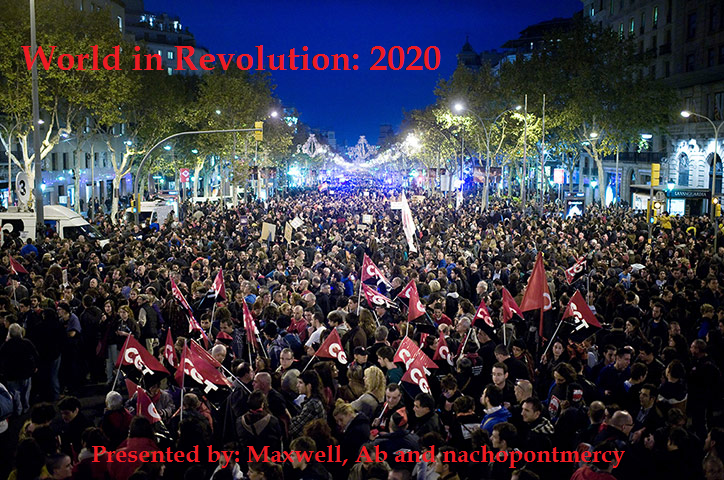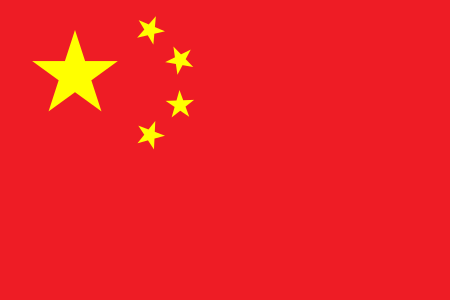
Hello! Welcome to World in Revolution: 2020 Mk. II! This game is developed by myself, Ab Ovo, nachopontmercy and Frymonmon and is inspired by, and based off of, the similar games by Frymonmon.
Nation Registration: Open/CLOSED
Nations Taken: 27/27
Now this is where things get different from the other World in Revolutions. Unlike in the past ones where you had your history decided for you, now is your chance to write it! So mold 2013 to 2020 as you like, the only rules for this however is that it must stay in the realm of plausibility and must not drastically alter another nation(unless you have their approval or that of the GM). After you’ve been approved in said nation and completed your history, you simply send it to the GMs so they may confirm it and you’re ready to go! Though, I must emphasize that the year 2019 will be taken more as a suggestion from yourself than the certain history.
Rules & Procedures
The rules are fairly simple. As the leader of your nation, you send the orders you wish to do to me, Maxwell. The orders you choose are basically unlimited, your only restraints are the time period and your imagination. This means, if you want to hatch a crazy plan of trapping African Gorillas and letting them loose in Washington, D.C. well. Go ahead. If you want to build a Faster-Than-Light Spaceship in 2030, it's not going to happen. Keep in mind, you can trade with other nations, create secret treaties, wage war and all of that fun stuff. Also, Nuclear Weapons. But don't use them.
Ever.
Each turn will constitute a single year. We start off on January 1st, 2020. I do not foresee any reason to speed up or slow down the game. It's been in the rules since WiR 1861, but it's never been done so this is just filler space to make the original post look longer than it really is.
Now, what is your main goal in this entire game? Guide your nation through this turbulent era. This basically means you will need to try and survive this huge uprising and economic crisis facing the world today. World in Revolution takes into account for your population. Although you can ignore these movements and even suppress them, you should keep them in mind. This is to make sure the game is kept to a degree of realism. This will not be an absolute strict restraint on your nation, but it will be an underlying factor. World in Revolution is built on the underlying factors, which the GMs take care of, don't worry. At any time you can ask the GM the "Mood of your nation", and you can request a run down from me.
In this game, if your government is overthrown by either popular movements or by armed force, you will be removed from the game.
If you are going to post something In Character (IC) then you simply post in the thread, using a flag if you wish to help others know what nation is speaking. If you are saying something Out Of Character (OOC) then you must add the tag "OOC:" before your post. If you do not do so, your post WILL be taken as IC, and can be used against you by other players in IC.
Orders
A Nation shall submit their orders to me via Private Message. In the title of this message it MUST have your countries name and the date, as well as the months this order is for. For example, for the United Kingdom at the game's start, it would read "WiR - United Kingdom 2020"
The orders are fairly simple. Every nation is allowed to send me 4 orders of any kind encompassing anything. However, there is a twist. If your nation is at war, you get a supplemental "War Plan". You must clarify what is your War Plan, and you are entitled to using 4 lines or sentences to describe what you want done. In order to try and make sure I remain sane, and can produce updates, each nation is limited to using only two sentences for their orders. The 4 normal orders can only be two lines long. Also, if you are a democracy you will have an Election order every four or so years(the length between depends on your constitution).
Updates
There are two types of updates. A Normal Update encompasses on entire year. This is the largest update and most of the action takes place here. Wars, Diplomacy, Nation Building ect. The next type of update is a War Update. A Mini-Update is similar to the Normal Update, but it takes place alongside of the Normal Update, and it uses up normal orders. This can encompass anything a Normal Update normally would, but is generally more specific, such as details of a specific battle in a war, or turmoil in a country that would normally get two lines in the Normal Update.
Specific Rules
* All Mobilization by countries must be announced 24 Hours before the official order deadlines.
* Declarations of War are final, and cannot be taken back. Only a Peace Treaty may resolve the conflict
IRC Channel:
Link: Coldfront
IRC: #WiR_Main
Instructions: Here
Rule Changes
N/A
---
Table of Contents

2019

2020
Mini Updates
Last edited:




